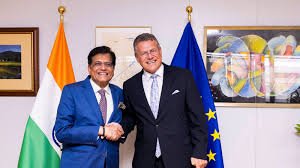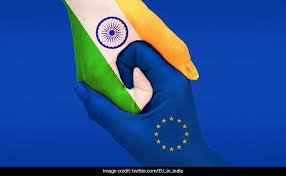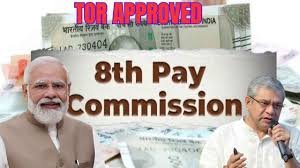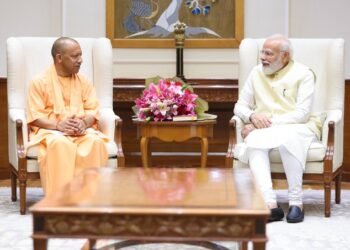India and the European Union agree to accelerate talks on a balanced and comprehensive Free Trade Agreement (FTA) as New Delhi seeks clarity on EU’s proposed carbon tax and new steel regulations.
New Delhi (Economy India): India and the European Union (EU) have agreed to fast-track negotiations for a balanced, comprehensive, and mutually beneficial trade agreement, signaling a renewed momentum in one of the world’s most significant ongoing trade discussions.
The development came after a high-level meeting between senior negotiators from both sides, held in New Delhi from November 3 to 7, where key issues such as market access, sustainable trade practices, carbon tax implications, and regulatory harmonization were discussed in depth.
India Seeks Clarity on EU’s Carbon Tax and Steel Regulations
During the discussions, Indian officials emphasized the need for greater clarity and transparency regarding the European Union’s proposed Carbon Border Adjustment Mechanism (CBAM) — often referred to as the “carbon tax.”
The CBAM, expected to come into effect gradually over the next few years, would impose additional tariffs on imports based on their carbon emissions footprint.
India has expressed concern that such measures could impact Indian steel, aluminum, and cement exports to Europe, as compliance costs may increase significantly.
Similarly, India sought detailed explanations on the EU’s new steel regulatory framework, which mandates stricter quality and sustainability standards for imports. These measures, Indian officials noted, must not become non-tariff barriers that hurt developing economies.
A Push Toward a Balanced, Modern Agreement
The Ministry of Commerce and Industry said in an official statement that the week-long meeting aimed to advance discussions toward a comprehensive, balanced, and modern trade partnership that reflects shared priorities.
“Both sides reiterated their commitment to achieving a fair and forward-looking trade agreement that promotes sustainability, economic growth, and inclusive development,” the statement read.
The ministry added that the dialogue aligns with India’s broader goal of expanding global trade partnerships while ensuring domestic industries remain competitive under evolving global standards.

Revival of the Long-Pending India–EU FTA
The India–EU Free Trade Agreement (FTA) negotiations were relaunched in June 2022, after nearly nine years of inactivity. The talks initially began in 2007 but stalled in 2013 over differences in issues such as tariff reductions, intellectual property rights, and labor standards.
The revived talks now cover a broader range of sectors including goods and services trade, investment protection, digital economy, supply chain resilience, and sustainability cooperation.
Officials noted that both sides are working to bridge existing gaps through progressive, phased agreements, ensuring that key areas of mutual benefit are prioritized.
Bilateral Trade and Economic Partnership Overview
The European Union is currently India’s third-largest trading partner, accounting for nearly 10.8% of India’s total trade in 2024, while India ranks as the EU’s tenth-largest trading partner.
According to official data, bilateral trade between India and the EU surpassed USD 130 billion in FY 2024–25, marking a year-on-year growth of nearly 12%. The trade basket includes machinery, pharmaceuticals, textiles, chemicals, auto components, and agricultural products.
Economists believe that a successful FTA could boost bilateral trade to over USD 200 billion within the next five years, creating opportunities for businesses on both sides and accelerating supply chain diversification away from China.
Focus on Green Growth and Technology Exchange
Both India and the EU share a strong commitment to sustainable growth and climate resilience. The ongoing trade talks also aim to promote cooperation in areas such as renewable energy, electric mobility, carbon credit systems, and circular economy practices.
The EU’s Green Deal policy and India’s Net Zero 2070 vision are being aligned to foster joint investment in clean technology and research. Experts suggest that European funding and Indian manufacturing strength could create a powerful partnership for global green transformation.
Challenges Ahead
Despite visible progress, experts caution that several contentious issues remain unresolved, including tariff reductions on automobiles, wines, and dairy products, as well as India’s demand for liberal visa norms for its professionals and IT workers.
Additionally, differences in data protection standards and intellectual property rights frameworks continue to pose technical challenges in finalizing the deal.
Trade analysts, however, remain optimistic that the current pace of talks and mutual goodwill could help achieve a framework agreement by mid-2026, ahead of the European Parliament elections.

Strategic and Geopolitical Importance
Beyond trade, the India–EU partnership carries significant geopolitical weight. Both parties view the collaboration as a means to strengthen the rules-based international order, enhance connectivity through the Global Gateway initiative, and promote resilient global supply chains amid shifting global power dynamics.
As global economic blocs redefine their alliances post-pandemic, the India–EU agreement could serve as a strategic economic pillar, ensuring stability, growth, and sustainability for decades to come.
The agreement to accelerate trade negotiations reflects a deepening trust and a shared recognition of the potential for economic collaboration. As India pushes for fairer trade norms and sustainable development, and the EU seeks a reliable partner in Asia, the upcoming rounds of discussions are expected to lay the foundation for a landmark global trade agreement.
(Economy India)












